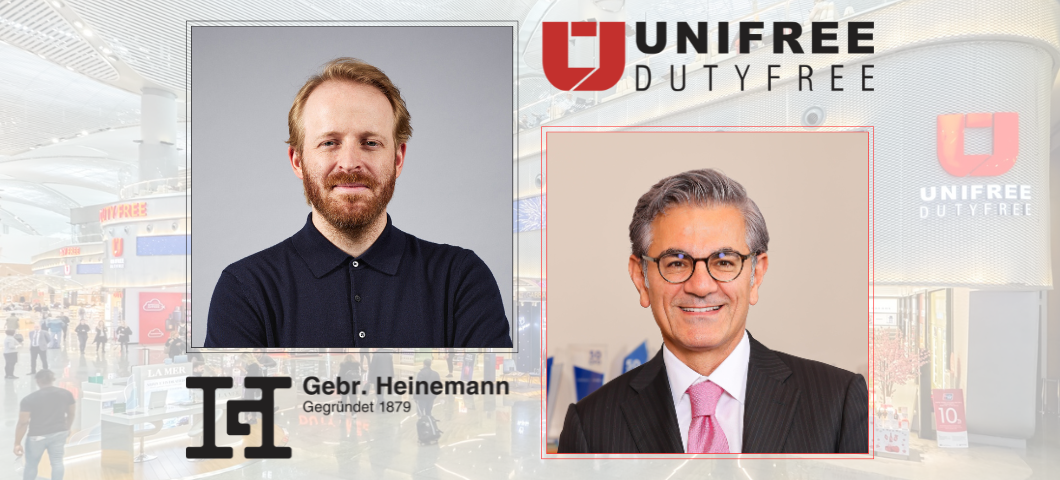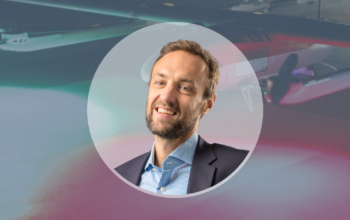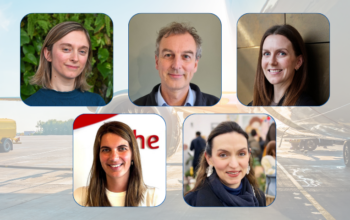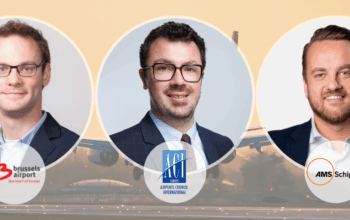
Gebr. Heinemann & Unifree: Charting a Course for Success
Gebr. Heinemann and Unifree Duty Free joined forces for this year’s ACI EUROPE Annual Congress & General Assembly becoming the event’s Diamond Sponsor. This partnership is another case in point of your companies’ ability to find strategic allies and work collaboratively towards outstanding business results. How are you leveraging partnerships for business success?
Max Heineman, Co-CEO of Gebr. Heinemann:
“We strongly believe in the positive impact of strong partnerships. Trustful collaboration on eye-level is fruitful for all parties involved. Leveraging partnerships means combining the strengths of each partner to achieve the best possible results. One way we do this is by offering individualized business models – from center management, to the formation of joint ventures (JVs) over concessions contracts and supply and services agreements. This way we can offer tailor-made solutions for a great variety of sales channels and locations. We are also convinced that trust is the foundation to be innovative in a partnership. As Heinemann we are always open to try out new things and innovations on the shop floor. But this requires that all partners involved are open to innovation and also to sharing risks to make this a success. We are aiming for long-term partnerships in which not only profits are shared, but also risks.”
Korhan Öz, CEO of Unifree Duty Free:
“At Unifree Duty Free, we recognize the critical importance of leveraging partnerships, especially in the unique environment of travel retail. We prioritize establishing trust-based, long-lasting collaborations with partners who share our goals and values, while bringing different strengths to the table. By sharing risks and resources with our partners, we gain greater flexibility and power. This approach enhances the capabilities, reach, and competitive advantage of both parties, ensuring long-term business success.”
The Istanbul Airport retail concept, created and ran jointly by Gebr. Heinemann and Unifree Duty Free, is a unique shopping experience, combining extensive core duty-free offer with a strong local sense. Could you tell us more about its key features and its success rate?
Korhan Öz, CEO of Unifree Duty Free:
“Istanbul Airport is the meeting point of passengers from all over the world. As Unifree Duty Free we serve more than 200 nationalities at a 56.000 sqm shopping area with more than 1000 global and local brands, in a 24/7 uninterrupted shopping service. Integrating cutting-edge technology into our operations, investing in human resources and sustainability efforts customizing our services for our guests, we are trying every other day to provide our passengers with a unique shopping experience. As a result of our efforts, we have recorded a +21% sales increase in 2023 vs 2022 and an impressive performance was driven by a +7% uplift in sales per passenger (SPP).”
This month, you unveiled an exciting joint campaign at Istanbul Airport with the iconic luxury brand Chanel. Premium and luxury experiences have become increasingly valued by travellers, especially compared to the pre-pandemic period. What is your secret to selecting and attracting the right luxury brands to enhance the travel retail offering at airports? And can you tell us more about this specific Chanel Summer Club pop-up?
Korhan Öz, CEO of Unifree Duty Free:
“As you mentioned, we’ve observed a significant shift towards premium and luxury experiences among travellers in the post-pandemic era. Today’s travellers are increasingly seeking memorable and exclusive moments that elevate their journeys.
At Unifree Duty Free, we carefully curate our assortment and tailor our services with these evolving needs and desires in mind. Our goal extends beyond simply connecting brands with customers; we aim to create unforgettable experiences for travellers. Through our collaborations with the brands, we transform brand spaces into immersive experience areas, enriched with special events that elevate the overall journey.
Our latest collaboration with Chanel is a testament to this commitment. The Chanel Summer Club pop-up at Istanbul Airport goes beyond being a mere shopping destination; it’s a sensory journey that captures the essence of summer, luxury, and the timeless elegance that Chanel represents. This pop-up allows travellers to fully immerse themselves in the world of Chanel, offering them access to an exclusive range of products in a setting that is as chic as it is inviting. Moreover, the Chanel Summer Club features interactive elements that deepen the connection between travellers and the brand, transforming their time at Istanbul Airport into a truly unforgettable experience.”
How do you ensure your business is resilient to macro-economic pressures and the impact of geopolitics?
Max Heineman, Co-CEO of Gebr. Heinemann:
“As a family-run company, we think in terms of generations and not quarters. We always focus on long-term business development and entrepreneurial independence is one of our top priorities. This forms a good basis for a resilient business model that has already mastered many market-economic and geopolitical challenges in the past. However, these were often localized and frequently resulted in alternative movements of travellers, which meant that other locations benefited more. The pandemic, however, was a new level that presented the entire travel retail industry with major international challenges for the first time. And it also changed the business more generally – especially in the Asia-Pacific region, which benefited for a long time from high spendings of Chinese travellers. But Chinese travellers have changed, which leads to different spending behaviours – also influenced by a stronger focus on saving rather than spending. In addition, many countries are currently still facing rather high inflation rates. Both aspects do have an impact on our business in these markets.
One of our strategies to increase the resilience of our company is to further diversify our business, both geographically and across sales channels. At the same time, we always believe in the power of strong partnerships, even in challenging times. This has also been demonstrated during the pandemic, where, for example, we were able to develop good solutions with many airport partners that helped everyone involved to get through this challenging time.”
Identifying new trends and innovations is a key strength for travel retail companies. Do you have a structure in place to test new concepts and brands and gauge their viability?
Max Heineman, Co-CEO of Gebr. Heinemann:
“Being innovative and always up-to-date regarding any trends is definitely key and something our partners rightly demand of us. We work on these topics in multiple ways: The teams of our three purchasing departments (Liquor, Tobacco, Confectionary (LTC); Fashion, Accessories, Watches & Jewely (FAWJ); Beauty) are always searching for the newest trends and the upcoming brands in their respective category. They are also in very close contact with suppliers to make sure we can provide innovative and exclusive products to the travelers.
We also established test & learn spaces in our shops, where we do provide the possibility for new and upcoming brands to try their entry into the travel retail market – which is always a great chance as you do have a very international audience you can present your product to, compared to domestic retail.
In addition to following trends and innovations in the product categories, we do have a department called “Sales Experience and Excellence”. One key competence of this team is to anticipate and keep track of general trends and developments – especially when retail related. They do monitor trends, evaluate what could work and fit with our business and develop and realize concepts for the shop floor. This way we can always improve the experience for travelers.
We also have a unit focusing only on innovation that is more detached from our daily business: we established our innovation hub GHARAGE some years ago.”
Next to competitiveness and innovation, sustainability is a key challenge for businesses across all sectors. Airports have a long-standing track record of addressing their carbon emissions within the Airport Carbon Accreditation programme – the global carbon standard encouraging airports to work with their business partners, including retailers, on minimising the overall carbon footprint. What is your approach to this important topic?
Max Heineman, Co-CEO of Gebr. Heinemann:
“When it comes to sustainability, we are convinced that we can achieve the most in strong and trustful partnerships on eye-level. Our aim is to leave the smallest carbon footprint in the global travel retail industry. To achieve this, we do work closely with suppliers and with airport partners. In our sustainability strategy we defined four areas of action: ‘Environment,’ ‘Social,’ ‘Governance,’ and ‘Responsible Value Chain.’ We set ambitious goals to be achieved by 2030. Several of these goals and actions are also directly related to our business at airports – in distribution and in retail. This goes from measures along the supply chain all the way to our product portfolio in the shops. Especially when it comes to measures inside the shops, we depend on a close partnership with airports to work on topics like sustainable shop designs or more sustainable lightning concepts. As in other areas of cooperation, open discussions and data-sharing would be beneficial for all parties here as well.”
Korhan Öz, Unifree Duty Free:
“At Unifree Duty Free, we approach sustainability from a holistic perspective, focusing on key areas such as gender equality, equal opportunity, diversity, inclusion, accessibility, and the environment. Recognizing that true progress toward a sustainable future requires collective effort, we prioritize partnerships that align with these values and work collaboratively on sustainability initiatives.
One of our recent initiatives exemplifies this approach. Last month, we joined forces with Gebr. Heinemann and Mars Logistics for a pilot project aimed at reducing logistics CO2 emissions. By utilizing a combination of train and truck transport, we achieved a significant 65% reduction in CO2 emissions. This pilot project also highlighted tangible environmental benefits, such as saving 112 trees per tour.
Our commitment to sustainability encourages us to work with business partners to minimize our overall carbon footprint. By integrating sustainability into our core operations and fostering partnerships that share our vision, we aim to make meaningful contributions to a more sustainable future.”
Could you share with us a sneak peek into your plans for the next 12 months, if possible? What key initiatives are you looking forward to the most?
Max Heineman, Co-CEO of Gebr. Heinemann:
“We are always working hard on further improving our offers for travelers and partners. This is something always high on our agenda. Currently, we are working on several great projects which will come to life in the coming months – not all of them can be shared already. What will remain in the focus for our own retail stores is bringing our Mission Statement and our Vision to turn travel time into valuable time as the most human-centric company in global travel retail to the shop floor.
Besides this, it always excites us to enter into new markets. We just took over operations at Jeddah Airport and will celebrate an official opening in Q2 2025. In addition, we are also looking forward to entering the Indian travel retail market.
These are two very promising countries when it comes to the further development of the travel sector and we are all looking forward to being part of this – in both cases also in strong partnerships.
Besides all these new initiatives, we are also focusing on our business in those markets, which are currently more challenging due to economic circumstances and changing traveller profiles.”
Korhan Öz, Unifree Duty Free:
“At Unifree Duty Free, several key initiatives are on the horizon for the next 12 months. A primary focus will be enhancing partnership opportunities with stakeholders and partners across various projects to provide customers with a unique shopping experience and exceptional service.
New sustainability projects are in development to contribute to a better future. Advanced technologies will be further integrated into operations to enhance the customer experience.
Expanding the product range by introducing more exclusive and local brands will cater to the diverse tastes of our global clientele. Additionally, comprehensive training programs will be implemented to invest in the workforce, ensuring exceptional service delivery.
Efficiency is the cornerstone of these initiatives. We will prioritize investments in human resources and cutting-edge technology, focusing on optimizing efficiency to make the most effective use of our resources as we roll out these projects in 2025.
Through these strategic initiatives, we aim to solidify Unifree Duty Free’s position as a leader in the travel retail industry, driving continued growth and success.”



